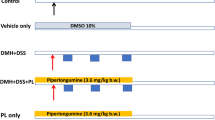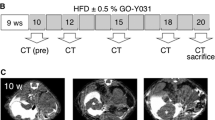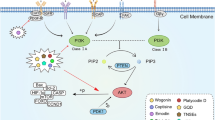Abstract
Colon cancer is one of the third most common cancer in man, the second most common cancer in women worldwide, and the second leading cause of mortality in the USA. There are a number of molecular pathways that have been implicated in colon carcinogenesis, including TGF-β/Smad signaling pathway. TGF-β (transforming growth factor-beta) signaling pathway has the potential to regulate various biological processes including cell growth, differentiation, apoptosis, extracellular matrix modeling, and immune response. TGF-β signaling pathway acts as a tumor suppressor, but alterations in TGF-β signaling pathway promotes colon cancer cell growth, migration, invasion, angiogenesis, and metastasis. Here we review the role of TGF-β signaling cascade in colon carcinogenesis and multiple molecular targets of curcumin in colon carcinogenesis. Elucidation of the molecular mechanism of curcumin on TGF-β signaling pathway-induced colon carcinogenesis may ultimately lead to novel and more effective treatments for colon cancer.





Similar content being viewed by others
References
Rao CV, Yamada HY. Genomic instability and colon carcinogenesis: from the perspective of genes. Front Oncol. 2013. doi:10.3389/fonc.2013.00130.
Shishodia S, Chaturvedi MM, Aggarwal BB. Role of curcumin in cancer therapy. Curr Probl Cancer. 2007;31:243–305.
Shehzad A, Khan S, Shehzad O, Lee YS. Curcumin therapeutic promises and bioavailability in colorectal cancer. Drugs Today. 2010;46:523–32.
Bardou M, Barkun AN, Martel M. Republished: obesity and colorectal cancer. Postgrad Med J. 2013;89:519–33.
Grundmann RT, Meyer F. Gender-specific influences on incidence, screening, treatment, and outcome of colorectal cancer. Zentralbl Chir. 2013;138:434–41.
Sasazuki S, Charvat H, Hara A, Wakai K, Nagata C, Nakamura K. Diabetes mellitus and cancer risk: pooled analysis of eight cohort studies in Japan. Cancer Sci. 2013. doi:10.1111/cas.12241.
Giovannucci E. Modifiable risk factors for colon cancer. Gastroenterol Clin N Am. 2002;31:925–43.
Takayama T, Miyanishi K, Hayashi T, Sato Y, Niitsu Y. Colorectal cancer: genetics of development and metastasis. J Gastroenterol. 2006;41:185–92.
Elliott RL, Blobe GC. Role of transforming growth factor Beta in human cancer. J Clin Oncol Off J Am Soc Clin Oncol. 2008;23:2078–93.
Li F, Cao Y, Townsend CM, Ko TC. TGF-β Signaling in colon cancer cells. World J Surg. 2005;29:306–11.
Meulmeester E, Dijke P. The dynamic roles of TGF-β in cancer. J Pathol. 2011;223:206–19.
Derynck R, Zhang YE. Smad-dependent and Smad-independent pathways in TGF-beta family signalling. Nature. 2003;425:577–84.
Scollen S, Luccarini C, Baynes C, Driver K, Humphreys MK, Garcia-Closas M. TGF-β signaling pathway and breast cancer susceptibility. Cancer Epidemiol Biomarkers Prev. 2011;20:1112–9.
Donovan J, Slingerland J. Transforming growth factor-beta and breast cancer: cell cycle arrest by transforming growth factor-beta and its disruption in cancer. Breast Cancer Res. 2000;2:116–24.
Xu Y, Pasche B. TGF-beta signaling alterations and susceptibility to colorectal cancer. Hum Mol Genet. 2007;16:R14–20.
Hocevar BA, Smine A, Xu XX, Howe PH. The adaptor molecule Disabled-2 links the transforming growth factor beta receptors to the Smad pathway. EMBO J. 2001;20:2789–801.
Moustakas A, Souchelnytskyi S, Heldin CH. Smad regulation in TGF-beta signal transduction. J Cell Sci. 2001;114:4359–69.
Penheiter SG, Mitchell H, Garamszegi N, Edens M, Doré JJE, Leof EB. Internalization-dependent and -independent requirements for transforming growth factor beta receptor signaling via the Smad pathway. Mol Cell Biol. 2002;22:4750–9.
Hayes S, Chawla A, Corvera S. TGF beta receptor internalization into EEA1-enriched early endosomes: role in signaling to Smad2. J Cell Biol. 2002;158:1239–49.
Di Guglielmo GM, Le Roy C, Goodfellow AF, Wrana JL. Distinct endocytic pathways regulate TGF-beta receptor signalling and turnover. Nat Cell Biol. 2003;5:410–21.
Lampropoulos P, Zizi-Sermpetzoglou A, Rizos S, Kostakis A, Nikiteas N, Papavassiliou AG. TGF-beta signalling in colon carcinogenesis. Cancer Lett. 2012;314:1–7.
Wu JW, Hu M, Chai J, Seoane J, Huse M, Li C. Crystal structure of a phosphorylated Smad2. Recognition of phosphoserine by the MH2 domain and insights on Smad function in TGF-beta signaling. Mol Cell. 2001;8:1277–89.
Itoh S, Itoh F, Goumans MJ, Dijke PT. Signaling of transforming growth factor-beta family members through Smad proteins. Eur J Biochem. 2000;267:6954–67.
Huse M, Muir TW, Xu L, Chen YG, Kuriyan J, Massagué J. The TGF beta receptor activation process: an inhibitor- to substrate-binding switch. Mol Cell. 2001;8:671–82.
Kurisaki A, Kose S, Yoneda Y, Heldin CH, Moustakas A. Transforming growth factor-beta induces nuclear import of Smad3 in an importin-beta1 and Ran-dependent manner. Mol Biol Cell. 2001;12:1079–91.
Massagué J. How cells read TGF-beta signals. Nat Rev Mol Cell Biol. 2000;1:169–78.
Miyazono K, Dijke P, Heldin CH. TGF-beta signaling by Smad proteins. Adv Immunol. 2000;75:115–57.
Dong C, Li Z, Alvarez RJ, Feng XH, Goldschmidt-Clermont PJ. Microtubule binding to Smads may regulate TGF beta activity. Mol Cell. 2000;5:27–34.
Gilboa L, Nohe A, Geissendörfer T, Sebald W, Henis YI, Knaus P. Bone morphogenetic protein receptor complexes on the surface of live cells: a new oligomerization mode for serine/threonine kinase receptors. Mol Biol Cell. 2000;11:1023–35.
Liberati NT, Moniwa M, Borton AJ, Davie JR, Wang XF. An essential role for Mad homology domain 1 in the association of Smad3 with histone deacetylase activity. J Biol Chem. 2001;276:22595–603.
Hanyu A, Ishidou Y, Ebisawa T, Shimanuki T, Imamura T, Miyazono K. The N domain of Smad7 is essential for specific inhibition of transforming growth factor-beta signaling. J Cell Biol. 2001;155:1017–27.
Datta PK, Moses HL. STRAP and Smad7 synergize in the inhibition of transforming growth factor beta signaling. Mol Cell Biol. 2000;20:3157–67.
Connolly EC, Freimuth J, Akhurst RJ. Complexities of TGF-β targeted cancer therapy. Int J Biol Sci. 2012;8:964–78.
Laiho M, DeCaprio JA, Ludlow JW, Livingston DM, Massague J. Growth inhibition by TGF-b1 linked to suppression of retinoblastoma protein phosphorylation. Cell. 1990;62:175–85.
Jansen-Durr P, Meichle A, Steiner P. Differential modulation of cyclin gene expression by MYC. Proc Natl Acad Sci U S A. 1993;90:3685–90.
Shibuya HJ, Yoneyama M, Ninomiya-Tsuji J, Matsumoto K, Taniguchi T. IL-2 and EGF receptors stimulate the hematopoietic cell cycle via different signaling pathways: demonstration of a novel role for cmyc. Cell. 1992;70:57–67.
Reynisdottir I, Polyak K, Iavarone A, Massague J. Kip/Cip and Ink4 Cdk inhibitors cooperate to induce cell cycle arrest in response to TGF-b. Genes Dev. 1995;9:1831–45.
Sandhu C, Garbe J, Daksis J. Transforming growth factor b stabilizes p15 INK4B protein, increases p15INK4B–cdk4 complexes and inhibits cyclin D1/cdk4 association in human mammary epithelial cells. Mol Cell Biol. 1997;17:2458–67.
Datto MB, Li Y, Panus JF. Transforming growth factor b induces the cyclin-dependent kinase inhibitor p21 through a p53 independent mechanism. Proc Natl Acad Sci U S A. 1995;92:5545–9.
Malliri A, Yeudall WA, Nikolic M. Sensitivity to transforming growth factor b1-induced growth arrest is common in human squamous cell carcinoma cell lines: c-MYC down-regulation and p21waf1 induction are important early events. Cell Growth Differ. 1996;7:1291–304.
Elbendary A, Berchuck A, Davis P. Transforming growth factor b1 can induce CIP1/WAF1 expression independent of the p53 pathway in ovarian cancer cells. Cell Growth Differ. 1994;12:1301–7.
Fynan TM, Reiss M. Resistance to inhibition of cell growth by transforming growth factor-beta and its role in oncogenesis. Crit Rev Oncogenesis. 1993;4:493–540.
Schuster N, Krieglstein K. Mechanisms of TGF-beta-mediated apoptosis. Cell Tissue Res. 2002;307:1–14.
Hanahan D, Weinberg RA. The hallmarks of cancer. Cell. 2000;100:57–70.
Yoo J, Ghiassi M, Jirmanova L, Balliet AG, Hoffman B, Fornace AJ. Transforming growth factor-beta-induced apoptosis is mediated by Smad-dependent expression of GADD45b through p38 activation. J Biol Chem. 2003;278:43001–7.
Valderrama-Carvajal H, Cocolakis E, Lacerte A, Lee EH, Krystal G, Ali S. Activin/TGF-beta induce apoptosis through Smad-dependent expression of the lipid phosphatase SHIP. Nat Cell Biol. 2002;4:963–9.
Lu T, Burdelya LG, Swiatkowski SM, Boiko AD, Howe PH, Stark GR. Secreted transforming growth factor beta2 activates NF-kappaB, blocks apoptosis, and is essential for the survival of some tumor cells. Proc Natl Acad Sci U S A. 2004;101:7112–7.
Gatza CE, Holtzhausen A, Kirkbride KC, Morton A, Gatza ML, Datto MB. Type III TGF-β receptor enhances colon cancer cell migration and anchorage-independent growth. Neoplasia. 2011;13:758–70.
Slattery ML, Lundgreen A, Herrick JS, Wolff RK, Caan BL. Genetic variation in the transforming growth factor-β signaling pathway and survival after diagnosis with colon and rectal cancer. Cancer. 2011;117:4175–83.
Kardamakis D, Ravazoula P, Zolota V, Salakou S, Tepetes K, Kalogeropoulou C. The potential role of TGFβ1, TGFβ2 and TGFβ3 protein expression in colorectal carcinomas. Strahlenther Onkol. 2004;18:201–8.
Gulubova M, Manolova I, Ananiev J, Julianov A, Yovchev Y, Peeva K. Role of TGF-β1, its receptor TGFβRII, and Smad proteins in the progression of colorectal cancer. Int J Colorectal Dis. 2010;25:591–9.
MacKay SL, Auffenberg T, Tannahill CL, Ksontini R, Josephs MD, Nowak M. Transfection of the type II TGF-beta receptor into colon cancer cells increases receptor expression, inhibits cell growth, and reduces the malignant phenotype. Ann Surg. 1998;227:781–9.
Grady WM, Rajput A, Myeroff L, Liu DF, Kwon K, Willis J. Mutation of the type II transforming growth factor-beta receptor is coincident with the transformation of human colon adenomas to malignant carcinomas. Cancer Res. 1998;58:3101–4.
Friedman E, Gold LI, Klimstra D, Zeng ZS, Winawer S, Cohen A. High levels of transforming growth factor beta 1 correlate with disease progression in human colon cancer. Cancer Epidemiol Biomarkers Prev. 1995;4:549–54.
Fink SP, Swinler SE, Lutterbaugh JD, Massagué J, Thiagalingam S, Kinzler KW. Transforming growth factor-beta-induced growth inhibition in a Smad4 mutant colon adenoma cell line. Cancer Res. 2001;61:256–60.
Zhang B, Halder SK, Kashikar ND, Cho YJ, Datta A, Gorden DL. Antimetastatic role of Smad4 signaling in colorectal cancer. Gastroenterology. 2010;138:969–80.
Isaksson-Mettävainio M, Palmqvist R, Forssell J, Stenling R, Oberg A. SMAD4/DPC4 expression and prognosis in human colorectal cancer. Anticancer Res. 2006;26:507–10.
Fleming NI, Jorissen RN, Mouradov D, Christie M, Sakthianandeswaren A, Palmieri M. SMAD2, SMAD3 and SMAD4 mutations in colorectal cancer. Cancer Res. 2013;73:725–35.
Xie W, Rimm DL, Lin Y, Shih WJ, Reiss M. Loss of Smad signaling in human colorectal cancer is associated with advanced disease and poor prognosis. Cancer J. 2003;9:302–12.
Miyaki M, Iijima T, Konishi M, Sakai K, Ishii A, Yasuno M. Higher frequency of Smad4 gene mutation in human colorectal cancer with distant metastasis. Oncogene. 1999;18:3098–103.
Basile V, Ferrari E, Lazzari S, Belluti S, Pignedoli F, Imbriano C. Curcumin derivatives: molecular basis of their anti-cancer activity. Biochem Pharmacol. 2009;78:1305–15.
Shehzad A, Lee J, Lee YS. Curcumin in various cancers. BioFactors. 2013;39:56–68.
Patel BB, Majumdar APN. Synergistic role of curcumin with current therapeutics in colorectal cancer: minireview. Nutr Cancer. 2009;61:842–6.
Shehzad A, Lee YS. Curcumin: multiple molecular targets mediate multiple pharmacological actions: a review. Drug Future. 2010;35:113–9.
Shehzad A, Wahid F, Lee YS. Curcumin in cancer chemoprevention: molecular targets, pharmacokinetics, bioavailability, and clinical trials. Arch Pharm (Weinheim). 2010;343:489–99.
Lao CD, Ruffin MT, Normolle D. Dose escalation of a curcuminoid formulation. BMC Complement Altern Med. 2006;6:10.
Chen A, Xu J. Activation of PPAR_ by curcumin inhibits Moser cell growth and mediates suppression of gene expression of cyclin D1 and EGFR. Am J Physiol Gastrointest Liver Physiol. 2005;288:G447–56.
Johnson JJ, Mukhtar H. Curcumin for chemoprevention of colon cancer. Cancer Lett. 2007;255:170–81.
He ZY, Shi CB, Wen H, Li FL, Wang BL, Wang J. Upregulation of p53 expression in patients with colorectal cancer by administration of curcumin. Cancer Investig. 2011;29:208–13.
Mo N, Z-Q L, Li J, Cao Y-D. Curcumin inhibits TGF-β1-induced MMP-9 and invasion through ERK and Smad signaling in breast cancer MDA- MB-231 cells. Asian Pac J Cancer Prev. 2012;13:5709–14.
Milacic V, Banerjee S, Landis-Piwowar KR, Sarkar FH, Majumdar APN, Dou QP. Curcumin inhibits the proteasome activity in human colon cancer cells in vitro and in vivo. Cancer Res. 2008;68:7283–92.
Rayet B, Gélinas C. Aberrant rel/nfkb genes and activity in human cancer. Oncogene. 1999;18:6938–47.
Chung M-Y, Lim TG, Lee KW. Molecular mechanisms of chemopreventive phytochemicals against gastroenterological cancer development. World J Gastroenterol. 2013;19:984–93.
Mendelson J, Song S, Li Y, Maru DM, Mishra B, Davila M, et al. Dysfunctional transforming growth factor-β signaling with constitutively active notch signaling in Barrett’s esophageal adenocarcinoma. Cancer. 2011;117:3691–702.
Subramaniam D, Ponnurangam S, Ramamoorthy P, Standing D, Battafarano RJ, Anant S, et al. Curcumin induces cell death in esophageal cancer cells through modulating Notch signaling. PLoS ONE. 2012;7:e30590.
Patel BB, Gupta D, Elliott AA, Sengupta V, Yu Y, Majumdar APN. Curcumin targets FOLFOX-surviving colon cancer cells via inhibition of EGFRs and IGF-1R. Anticancer Res. 2010;30:319–25.
Ryu M-J, Cho M, Song J-Y, Yun Y-S, Choi I-W, Kim D-E, et al. Natural derivatives of curcumin attenuate the Wnt/beta-catenin pathway through down-regulation of the transcriptional coactivator p300. Biochem Biophys Res Commun. 2008;377:1304–8.
Rao CV, Rivenson A, Simi B, Reddy BS. Chemoprevention of colon carcinogenesis by dietary curcumin, a naturally occurring plant phenolic compound. Cancer Res. 1995;55:259–66.
Kawamori T, Lubet R, Steele VE, Kelloff GJ, Kaskey RB, Rao CV, et al. Chemopreventive effect of curcumin, a naturally occurring anti-inflammatory agent, during the promotion/progression stages of colon cancer. Cancer Res. 1999;59:597–601.
Li R, Wang Y, Liu Y, Chen Q, Fu W, Wang H, et al. Curcumin inhibits transforming growth factor-β1-induced EMT via PPARγ pathway, not Smad pathway in renal tubular epithelial cells. Mohanraj R, editor. PLoS ONE. 2013;8:e58848.
Acknowledgement
The authors would like to acknowledge the Department of Biotechnology, School of Bioengineering, SRM University, Kattankulathur 603203, Tamilnadu, India for the financial support.
Conflicts of interest
None
Author information
Authors and Affiliations
Corresponding author
Rights and permissions
About this article
Cite this article
Ramamoorthi, G., Sivalingam, N. Molecular mechanism of TGF-β signaling pathway in colon carcinogenesis and status of curcumin as chemopreventive strategy. Tumor Biol. 35, 7295–7305 (2014). https://doi.org/10.1007/s13277-014-1840-1
Received:
Accepted:
Published:
Issue Date:
DOI: https://doi.org/10.1007/s13277-014-1840-1




